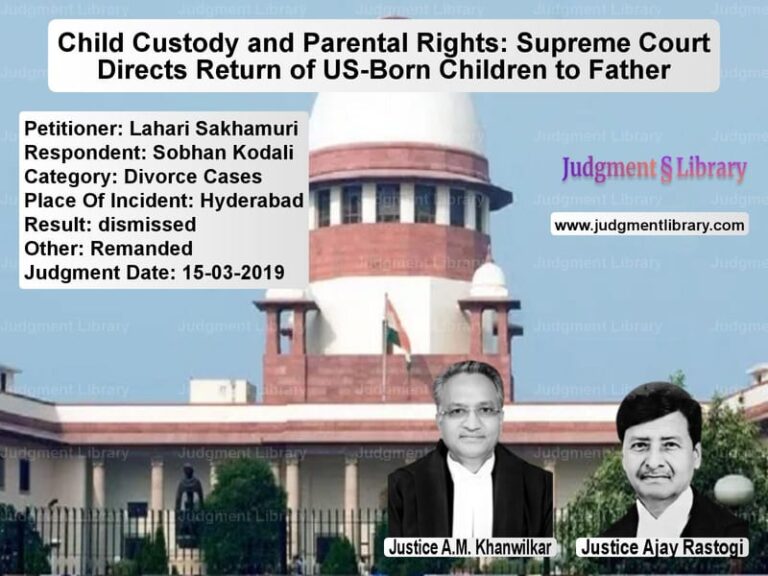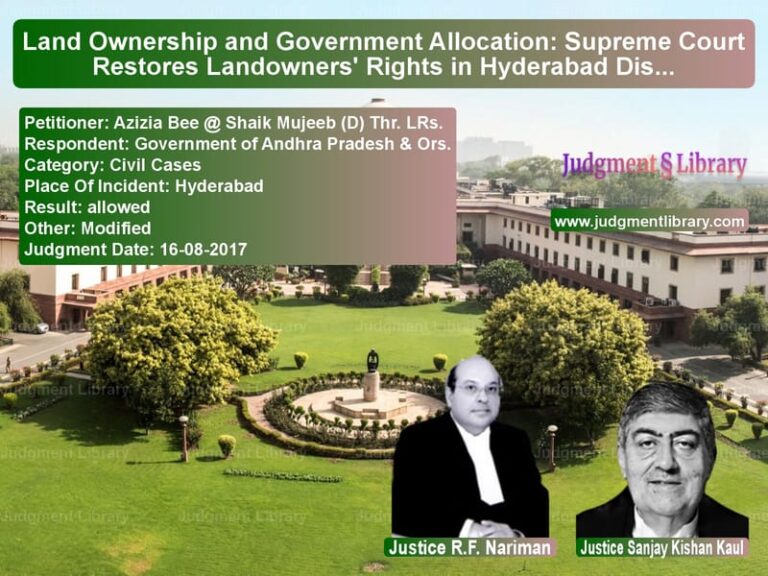Mortgage Dispute: Supreme Court Overrules High Court in Property Auction Case
The Supreme Court of India recently decided on a significant property dispute in the case of H.S. Goutham vs. Rama Murthy & Others, overturning the Karnataka High Court’s ruling. The case involved a mortgage, a consent decree, an auction sale, and allegations of fraud. The Supreme Court ruled that once an auction sale is confirmed and the sale certificate is issued, it cannot be reversed based on belated fraud allegations.
Background of the Case
The dispute arose when the original defendants, Rama Murthy and others, borrowed money from the plaintiff’s father through a mortgage deed and a promissory note. The details were as follows:
- In 1990, the defendants borrowed ₹1,00,000 via a mortgage deed.
- In 1992, they took an additional loan of ₹50,000 through a promissory note.
- The mortgage was executed with a five-year repayment period, with 18% annual interest.
- The plaintiff, H.S. Goutham, filed a suit in 1995 after the defendants defaulted.
During the suit, the defendants agreed to a settlement where they would pay ₹2,50,000 in installments. The trial court passed a consent decree based on this settlement on June 1, 1995.
However, the defendants failed to comply, leading the plaintiff to initiate execution proceedings in 1996. The mortgaged property was auctioned in 1999, and H.M. Ravindra Kumar emerged as the highest bidder.
Petitioner’s (Plaintiff & Auction Purchaser) Arguments
The plaintiffs and the auction purchaser made the following arguments:
- The defendants agreed to the settlement but later raised fraud allegations without evidence.
- The execution court overruled fraud objections in 1998, which was never challenged in time.
- The property was auctioned as per due process, and the sale was confirmed in 1999.
- The auction purchaser paid the full bid amount and obtained a legally valid sale certificate.
- The defendants filed multiple appeals and revisions much later to delay the case.
- The High Court erred in calling for an additional fraud inquiry after years of litigation.
Respondent’s (Defendants) Arguments
The defendants argued:
- The consent decree was obtained by fraud as they were misled into signing the agreement.
- They were unfamiliar with legal procedures and unknowingly consented to the settlement.
- The auction was improperly conducted, and the auction purchaser was related to the plaintiff.
- The trial court should have examined the fraud allegations before confirming the decree.
Supreme Court’s Observations
The Supreme Court bench, comprising Justices Ashok Bhushan, R. Subhash Reddy, and M.R. Shah, made several key observations:
- The consent decree was valid as it was signed voluntarily by the defendants.
- The fraud allegations were raised too late—years after the decree was passed.
- The execution court had already overruled the fraud objections in 1998, and this order remained unchallenged.
- The High Court incorrectly reopened the case by calling for a fresh inquiry in 2005.
- Once a property is auctioned and a sale certificate is issued, it attains finality and cannot be reversed.
- The defendants deliberately delayed proceedings by filing multiple appeals and revisions.
The Supreme Court held:
“The auction sale, once confirmed and registered, attains finality. The High Court erred in allowing the defendants to challenge the sale after such a long delay.”
Final Judgment
The Supreme Court set aside the High Court’s decision and ruled:
- The consent decree passed in 1995 is legally valid.
- The objections raised by the defendants in 1998 were rightly rejected.
- The auction conducted in 1999 was legal and binding.
- The sale certificate issued to the auction purchaser remains valid.
- The defendants cannot challenge the decree or the auction sale after such an extended delay.
Impact of the Judgment
The Supreme Court’s ruling has significant legal implications:
- Finality of Auction Sales: Once a property is auctioned and a sale certificate is issued, it cannot be easily reversed.
- Fraud Allegations Must Be Timely: Fraud claims must be raised at the earliest stage and supported by evidence.
- Litigation Delays Cannot Be Encouraged: The court disapproved of the defendants’ delaying tactics.
- Execution Court’s Authority Upheld: The ruling reinforces that execution courts have the power to reject baseless objections.
- Protection of Auction Purchasers: Bona fide auction buyers are safeguarded from unnecessary legal disputes.
Conclusion
The Supreme Court’s decision in H.S. Goutham vs. Rama Murthy underscores the importance of adhering to legal procedures in mortgage and auction cases. It serves as a warning to litigants attempting to delay proceedings and emphasizes that fraud allegations must be raised promptly with proper evidence. The ruling also reassures auction purchasers that once a sale is confirmed, it remains legally binding.
Petitioner Name: H.S. Goutham & H.M. Ravindra Kumar.Respondent Name: Rama Murthy & Others.Judgment By: Justice Ashok Bhushan, Justice R. Subhash Reddy, Justice M.R. Shah.Place Of Incident: Bangalore, Karnataka.Judgment Date: 12-02-2021.
Don’t miss out on the full details! Download the complete judgment in PDF format below and gain valuable insights instantly!
Download Judgment: h.s.-goutham-&-h.m.-vs-rama-murthy-&-others-supreme-court-of-india-judgment-dated-12-02-2021.pdf
Directly Download Judgment: Directly download this Judgment
See all petitions in Property Disputes
See all petitions in Debt Recovery
See all petitions in Contract Disputes
See all petitions in Dispute Resolution Mechanisms
See all petitions in Specific Performance
See all petitions in Judgment by Ashok Bhushan
See all petitions in Judgment by R. Subhash Reddy
See all petitions in Judgment by Mukeshkumar Rasikbhai Shah
See all petitions in allowed
See all petitions in Quashed
See all petitions in supreme court of India judgments February 2021
See all petitions in 2021 judgments
See all posts in Civil Cases Category
See all allowed petitions in Civil Cases Category
See all Dismissed petitions in Civil Cases Category
See all partially allowed petitions in Civil Cases Category







